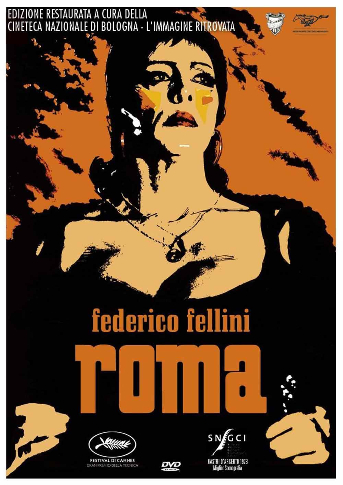A masterpiece of narrative freedom and unrestrained imagination, from the director who astonished the world
The Eternal City as never before depicted
Along with Amarcord, the 50-year-old Fellini paid a double homage to the cities closest to his heart: Rimini and Rome
“Rome is the ideal location for flights of the imagination”, affirmed Federico Fellini. And in this homage to the city – eternal, primordial, funereal, enormous, wise and bleak – Fellini unleashes all the unrestrained power of his unparalleled imagination, earning him the astonished admiration of every corner of the world. Part fake documentary, part fake autobiographical story, Roma is a masterpiece of narrative freedom, of fragmentary illusions, of mysterious fascinations. Fellini takes the audience by the hand and leads it into a visual and auditory vortex, as amazing now as when it was first released. It is impossible to list the best moments: the infernal confusion on the ring-road, the magical trip into the Roman Metropolitana, which hides a treasure that disappears with a gust of wind, the spectral ecclesiastical fashion show, the euphoria at the Festa de’ Noantri in Trastevere. Everything in Roma is of a certain value: one must simply abandon oneself into its womb and live the unforgettable trip to the fullest.
A visionary portrait of Rome through the eyes and memories of a young man from the provinces, who, shortly before the outbreak of World War II, arrives in the Eternal City. Through its depiction of a series of events and unique characters, the film gives the audience an experience of unlimited riches.
A masterpiece of narrative freedom and unrestrained imagination, from the director who astonished the world
The Eternal City as never before depicted
Along with Amarcord, the 50-year-old Fellini paid a double homage to the cities closest to his heart: Rimini and Rome
“Rome is the ideal location for flights of the imagination”, affirmed Federico Fellini. And in this homage to the city – eternal, primordial, funereal, enormous, wise and bleak – Fellini unleashes all the unrestrained power of his unparalleled imagination, earning him the astonished admiration of every corner of the world. Part fake documentary, part fake autobiographical story, Roma is a masterpiece of narrative freedom, of fragmentary illusions, of mysterious fascinations. Fellini takes the audience by the hand and leads it into a visual and auditory vortex, as amazing now as when it was first released. It is impossible to list the best moments: the infernal confusion on the ring-road, the magical trip into the Roman Metropolitana, which hides a treasure that disappears with a gust of wind, the spectral ecclesiastical fashion show, the euphoria at the Festa de’ Noantri in Trastevere. Everything in Roma is of a certain value: one must simply abandon oneself into its womb and live the unforgettable trip to the fullest.
A visionary portrait of Rome through the eyes and memories of a young man from the provinces, who, shortly before the outbreak of World War II, arrives in the Eternal City. Through its depiction of a series of events and unique characters, the film gives the audience an experience of unlimited riches.
